Pamela Christian's Blog, page 9
April 13, 2019
April 13-14 2019 – Events Leading to the Last Supper
The Advent of Easter, Part XX by Pamela Christian—Copyright © 2019
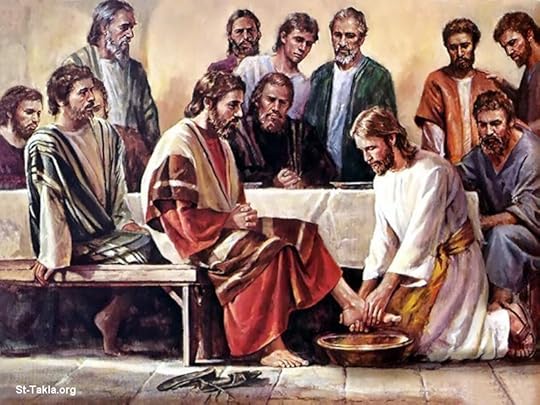
This post represents Nissan 12th and 13/14 in the last days of the life of Jesus. Many researchers, including myself, agree in the week of Jesus’ life Nissan 13/14 was our Tuesday/Wednesday. Remember, the Jewish days begin at sunset and conclude at sunset the next day. (See: http://www.eaec.org/newsletters/2012/vol-15-3/the-passover-week.htm)
Sometime in the daylight hours before sunset on Nissan 12th, (our Tuesday) while Jesus was at the home of Simon the leper, a woman came with an alabaster flask of ointment of pure nard, which is very costly. She poured it over Jesus’ head. While some who were present objected strongly, Jesus defended the woman and stated, “She has done what she could; she has anointed by body beforehand for burial.” (Matthew 16: 6-13) Most definitely those within hearing did not realize Jesus’ burial would very shortly occur.
This same afternoon, Judas Iscariot, who was one of Jesus’ twelve disciples, sought the chief priests of the religious leaders willing to participate in their plot to kill Jesus. Judas agreed to betray Jesus for a sum of money.
This is the same day Jesus’s disciples asked Him where they would celebrate the Passover. Jesus instructed them where to go and what to do for the intimate meal He planned for all of them together.
On Nissan 13th, before the Feast of Passover, when Jesus knew His hour had come to depart from this world, He laid aside His garments, and taking a towel, tied it around His waist. I imagine Jesus greeting the disciples as they arrived at the place where they would share the Passover meal.
Jesus poured water into a basin and began to wash the disciples’ feet. Imagine how the disciples must have felt. Jesus had been their Teacher. Washing people’s feet was a task reserved for non-Jewish slaves. In a culture where people walked long-distances on dusty roads in sandals, it was customary for the host to arrange for water and a slave to be available for foot washing.
Jesus was Jewish, yet he took on the task that was reserved for non-Jewish slaves. I see this as a foreshadow of the all-inclusive invitation for “whom so ever wills” to become a disciple of Christ, regardless of their heritage. Here Jesus provides yet another example for us to follow, that we may serve one another in humility. Jesus washing the feet of His disciples is a final proof of His love for them. In the days of Jesus.
The evening of this day, the calendar changes to the 14th of Nissan, the day the Passover Meal is to be eaten. Jesus and His disciples followed the custom for celebrating Passover, but only Jesus knew this would be His Last Supper.
Knowing the significance of what was about to take place, Jesus declared, “I have eagerly desired to eat this Passover with you before I suffer” (Luke 22:15). It was at this Seder that Passover at last obtained its real meaning and deepest significance. Passover was the memorial of the physical, historical redemption of God’s people from slavery, but only a shadow of the ultimate redemption about to take place. Jesus was about to become the ultimate sacrifice, to die once for all (Hebrews 9:26).
Events following Jesus’ Last Supper, His sudden arrest, unjust trials and sentence of crucifixion will be the topic of the next post.
For April 13-14, 2019 read and meditate on the following Scriptures:
Matthew 26-27:31, Mark 14:1-15:15, Luke 22:1-23:25, John 13:1-38.
Read John 14–18, noting these were Jesus’ last instructions given in all earnest during his final hours with His disciples, before His crucifixion.
Note: All the books in the award-winning Faith to Live By series are written to help people discover and live in life-giving truth. 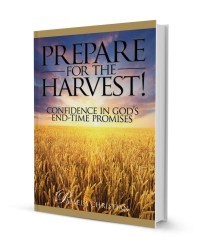 Visit the
Author Page
to learn more about the different books. When you purchase any of my products, you are helping support the ministry and spread the gospel of Jesus.
Visit the
Author Page
to learn more about the different books. When you purchase any of my products, you are helping support the ministry and spread the gospel of Jesus.
April 13-14 2019 – Events Leading the Last Supper
The Advent of Easter, Part XX by Pamela Christian—Copyright © 2019

This post represents Nissan 12th and 13/14 in the last days of the life of Jesus. Many researchers, including myself, agree in the week of Jesus’ life Nissan 13/14 was our Tuesday/Wednesday. Remember, the Jewish days begin at sunset and conclude at sunset the next day. (See: http://www.eaec.org/newsletters/2012/vol-15-3/the-passover-week.htm)
Sometime in the daylight hours before sunset on Nissan 12th, (our Tuesday) while Jesus was at the home of Simon the leper, a woman came with an alabaster flask of ointment of pure nard, which is very costly. She poured it over Jesus’ head. While some who were present objected strongly, Jesus defended the woman and stated, “She has done what she could; she has anointed by body beforehand for burial.” (Matthew 16: 6-13) Most definitely those within hearing did not realize Jesus’ burial would very shortly occur.
This same afternoon, Judas Iscariot, who was one of Jesus’ twelve disciples, sought the chief priests of the religious leaders willing to participate in their plot to kill Jesus. Judas agreed to betray Jesus for a sum of money.
This is the same day Jesus’s disciples asked Him where they would celebrate the Passover. Jesus instructed them where to go and what to do for the intimate meal He planned for all of them together.
On Nissan 13th, before the Feast of Passover, when Jesus knew His hour had come to depart from this world, He laid aside His garments, and taking a towel, tied it around His waist. I imagine Jesus greeting the disciples as they arrived at the place where they would share the Passover meal.
Jesus poured water into a basin and began to wash the disciples’ feet. Imagine how the disciples must have felt. Jesus had been their Teacher. Washing people’s feet was a task reserved for non-Jewish slaves. In a culture where people walked long-distances on dusty roads in sandals, it was customary for the host to arrange for water and a slave to be available for foot washing.
Jesus was Jewish, yet he took on the task that was reserved for non-Jewish slaves. I see this as a foreshadow of the all-inclusive invitation for “whom so ever wills” to become a disciple of Christ, regardless of their heritage. Here Jesus provides yet another example for us to follow, that we may serve one another in humility. Jesus washing the feet of His disciples is a final proof of His love for them. In the days of Jesus.
The evening of this day, the calendar changes to the 14th of Nissan, the day the Passover Meal is to be eaten. Jesus and His disciples followed the custom for celebrating Passover, but only Jesus knew this would be His Last Supper.
Knowing the significance of what was about to take place, Jesus declared, “I have eagerly desired to eat this Passover with you before I suffer” (Luke 22:15). It was at this Seder that Passover at last obtained its real meaning and deepest significance. Passover was the memorial of the physical, historical redemption of God’s people from slavery, but only a shadow of the ultimate redemption about to take place. Jesus was about to become the ultimate sacrifice, to die once for all (Hebrews 9:26).
Events following Jesus’ Last Supper, His sudden arrest, unjust trials and sentence of crucifixion will be the topic of the next post.
For April 13-14, 2019 read and meditate on the following Scriptures:
Matthew 26-27:31, Mark 14:1-15:15, Luke 22:1-23:25, John 13:1-38.
Read John 14–18, noting these were Jesus’ last instructions given in all earnest during his final hours with His disciples, before His crucifixion.
Note: All the books in the award-winning Faith to Live By series are written to help people discover and live in life-giving truth.  Visit the
Author Page
to learn more about the different books. When you purchase any of my products, you are helping support the ministry and spread the gospel of Jesus.
Visit the
Author Page
to learn more about the different books. When you purchase any of my products, you are helping support the ministry and spread the gospel of Jesus.
April 11, 2019
April 11-12 2019 – Understanding Passover
The Advent of Easter, Part XIX by Pamela Christian—Copyright © 2019
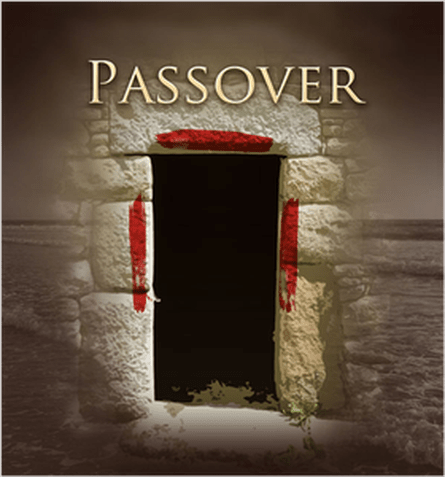
It’s imperative we understand the tremendous significance the original Passover has for us today.
The Passover, as recorded in the book of Exodus, is profound confirmation of God’s promise given to Adam and Eve—the first man and woman representing all of humanity for all time—in the Garden of Eden. Genesis 3 records God’s promise for a Redeemer/Deliverer to provide a way of escape from our natural-born sin condition, allowing those who receive God’s promise by faith to be eternally restored to Him. (For more on God’s promise of redemption, read March 8-9 post).
In the Old Testament, Egypt symbolically represents sin, or man’s rejection of God. The Hebrew people are God’s chosen people among whom God displays His power and desire for all humanity. The Hebrews were slaves to Egypt, representing humanity’s natural-born enslavement to sin and rejection of God. Pharaoh and his army represent Satan and his minions. Moses is a foreshadow of the true Promised Deliverer, Jesus.
Through the account of the Hebrews enslavement and ultimate freedom, God displays in the natural, what He will do in the spiritual.
God instructs Moses to tell the people, on the 10th of the then present month, which God established to become the first month of the Hebrew calendar (Nissan), to take an unblemished lamb—one lamb for a household or households according to the numbers of people so the lamb will be fully consumed. The lamb must be a year-old male. This lamb is to be kept until the 14th of the month when the whole assembly of the people shall kill their respective lambs for the evening meal.
The blood of this lamb was to be smeared on the doorposts of their homes where they would eat their meal. They were instructed to eat the meal with their belt fastened, sandals on their feet, and their staff in hand. Further, they were instructed to eat in haste. And God instructed Moses to have the people understand “It is the Lord’s Passover.”
The 10th of Nissan is therefore known as the Day of Preparation specifically for the Passover, which is in addition to the day of preparation for the weekly sabbath. At midnight, on the 14th of Nissan, the Lord’s judgment upon Pharaoh was ordered, and carried out, as the tenth plague against Pharaoh.
The blood on the doorposts of the obedient Hebrews was a sign to the death angel to pass over that household and move on to those homes without the blood of the lamb, where the firstborn male of the home would be slain.
With God’s people observing the Passover meal, dressed specifically as He instructed, they were ready to immediately gather their things to leave Egypt. This sudden departure is known as the Exodus. The Egyptians were so fearful of what would happen to them next if they did not release God’s people, that when the Hebrews asked for provisions the Egyptians readily gave them silver, gold, jewelry and clothing; and thus the Hebrews plundered the Egyptians.
The Passover represents how eternal death passes over each and every person who places their faith in God’s Word—His Promise—His Deliverer, who ultimately was revealed in the person of Jesus. For this reason, God instructs Moses that His people are to commemorate the Passover with the Feast of Unleavened Bread, each year following, over a seven-day period. In the Bible, leaven represents sin—which is the rejection of God and His ways.
The Hebrews did not know at the time of Moses’ instruction, that the Passover meal would be the last event they would experience in their land of captivity. Those who obeyed God, placing the blood of the lamb on their door posts and being properly attired, escaped escaped death and judgment. Based on what God had Moses instruct His people, they did not know once the death angel passed over their house, they would be fully released from captivity, with abundant provisions, with their route of escape fully provided before them by God that would take them to their land—the Promised Land of God.
In a profound similar manner, those of us today who place our faith in Jesus—who eat the Lamb of God, the Promised Deliverer—demonstrate our willingness to be obedient to God. This faith means we are spiritually dressed and supplied with more than what we need, to escape the way of sin and enter the Promised Land.
Everything done in the natural is intended by God to reveal the spiritual. Additionally, we must understand the promises of God are not merely for the future, but intended for us to enjoy on earth now. By faith and obedience, we can experience God’s will be done on earth as it is in heaven. It’s simply a matter of believing in Jesus and receiving all He offers. What is your response?
The next post we’ll delve into a proper understanding of Jesus’ Last Supper.
For April 11-12, 2019 read and meditate on the following Scriptures:
Exodus chapters 12-15; Psalm 27:12-14.
Scroll down below to access earlier posts in this series. To view the entire list of planned devotions, see the Introduction.
For author bio and schedule of posts for The Advent of Easter click here.
April 10, 2019
Word for Wednesday – Intentional Interaction
 As an author/speaker I spend hours each day in front of my computer screen, researching, reading, praying and writing. I love it, knowing it’s the foundation of my life’s work. At the same time, it’s an isolated and non-affirming existence. Unless someone takes the time to contact me to share a thought, I work all alone–even though my work is intended to reach countless numbers of people. In the workplace with peer interaction, there’s opportunity for feedback, appreciation, recognition, and yes politics–there’s always that. While I don’t miss the politics, I do miss personal interaction.
As an author/speaker I spend hours each day in front of my computer screen, researching, reading, praying and writing. I love it, knowing it’s the foundation of my life’s work. At the same time, it’s an isolated and non-affirming existence. Unless someone takes the time to contact me to share a thought, I work all alone–even though my work is intended to reach countless numbers of people. In the workplace with peer interaction, there’s opportunity for feedback, appreciation, recognition, and yes politics–there’s always that. While I don’t miss the politics, I do miss personal interaction.
Others share they feel isolated and marginalized because of our cultural consumption in the internet world of social media, which is woefully impersonal. Worse, without a healthy self-identity, social media can have tremendously adverse impact on us through the deceptive trend to compare ourselves with one another. Comparisons played out in the isolated “theater of our mind” are always detrimental. I have an entire message on the topic, “Thou Shall Not Compare.” Scroll down the page to located the MP3 to listen. It’s an excellent reminder of how God made you.
Today more than ever we need to seek in-person interaction and I’m following my own advise today. I will be meeting with the daughters and grand-daughters of one of the most remarkable godly women I’ve been privileged to know, Frances “Penny” Olivierie, who graduated to heaven earlier this year. We’re meeting at the same restaurant we always celebrated her birthday, in honor of her and enjoyment of one another.
Since internet interactions are here to stay, let’s intentionally develop new ways to genuinely connect. Don’t read, lurk, and move on. When something or someone positively influences you, send some sort of message to share your reaction. If someone needs encouragement, send a brief note or message. AND make a point of reaching out to your “real-world” of friends and family to regularly connect in person. Let’s be less “internet takers and more internet givers.” When you make someone else smile, your heart is warmed.
PS. I love hearing from you. Why not enter your comments here and let me know what you plan on doing to personally connect with people today.
My favorite part of my ministry work is traveling and speaking to groups where invited. I have experience and messages to speak to small, intimate groups, and auditorium size audiences, always bringing a message that reach hidden matters of the heart. Whether it be a Church/Corporate event, conference, retreat, panel discussion, or workshop, let me encourage you and your group. Learn more here and download resources here.
Word for Wednesday – Approaching Easter
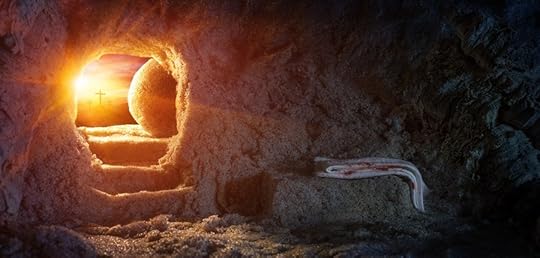
We are approaching what’s become known as Passion Week—the week beginning with Jesus’ triumphal entry into Jerusalem, ending with an empty tomb as revelation of Jesus being the long awaited Promised Redeemer—the Promised Deliverer from God. We celebrate our Risen Lord on Easter Sunday. However, I suggest, we should radially celebrate our Lord every day, all year, every year.
From the rejection of God in the Garden of Eden when God first promised humanity a way of escape, God’s plan was fully developed. He knew what He would personally do to redeem His beloved humanity, each one made in His image for the purpose of enjoying relationship with Him. God’s love for us is so great that He couldn’t bear being eternally separated from any one of us, so He devised a plan. Then at the perfect time in all God’s planned timeline for earth, Jesus, the Second Person of the Trinity, took on human form and joined humanity as a baby. He grew up in stature and understanding among us, experiencing the human existence in every way common to man. He’d willingly and temporarily laid down His divinity, to live life entirely in His humanity. And as such, through His unwavering reliance on the Heavenly Father, He lived a perfectly sinless life. Making Him the only suitable sacrifice to pay the penalty of sin, which is rejection of God, that we owe but cannot pay. Motivated by unfathomable love, Jesus paid the ultimate price for each one of us who are willing to believe in Him and receive Him as our personal Lord and Savior.
What does your life reveal regarding what you believe about Jesus?
In your heart of hearts, what do you know about yourself in the light of Jesus?
In the inner privacy of your being, what is God the Father speaking to you right now?
You may want to take time to contemplate more about your life before God and His radical love for you. If so, I encourage you to read the Advent of Easter posts I published beginning March 6th, 2019, here on this Faith Blog. You’ll find a post every other day leading up to Easter, created to help us genuinely consider our reality—our present day and eternal reality.
My life’s focus is to help people discover and live in the same life-giving Truth I’ve been blessed to find. It is my prayer for you that you realize the truth and willing surrender your whole self to Jesus, to be entirely transformed as a joint heir with Jesus, entitled to everything He died to offer you, Amen.
I’d love to hear from you and welcome you sharing my blog and web site with others. While I offer many books and resources here on my web site, if I can be of further assistance to you, please let me know.
April 9, 2019
April 9-10 2019 – Jesus The Lion of God
The Advent of Easter, Part XVII by Pamela Christian—Copyright © 2019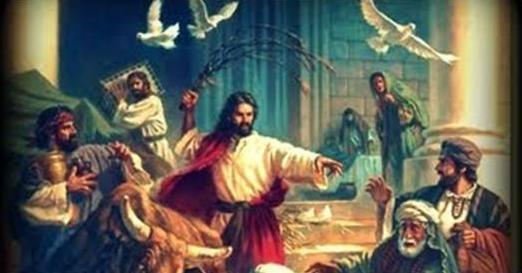
This post represents the 10th and 11th of Nissan in the last days of Jesus’ life on earth. Remember the Hebrew calendar days begin at sunset and end at sunset the next day.
After Jesus rode into Jerusalem on a donkey colt, uproariously hailed by the crowds, He stopped at the temple. Within the temple grounds was a sort of marketplace where commercial activity allowed pilgrims arriving in Jerusalem for the Passover celebration to exchange their foreign currency for temple currency and purchase animals and other items for sacrifice.
As Jesus looked around, He noted the manner in which the holy temple was being used. He observed the money changers making a profit from the exchange of currency, and the sellers of animals using unjust valuations. This was a blatant misuse of the temple system of worship. Jesus rejected the Jewish system of moneymaking from God’s Passover. He overturned the tables of the money-changers and the seats of those who sold pigeons. The temple was to be known as a house of prayer, not a place where merchants took economic advantage of people.
This display of outrage from Jesus is not the first. The first was early in His ministry when Jesus did a similar cleansing after the wedding in Cana. John 2:14-16 reads, “In the temple he found those who were selling oxen and sheep and pigeons, and the money-changers sitting there. And making a whip of cords, he drove them all out of the temple, with the sheep and oxen. And he poured out the coins of the money-changers and overturned their tables. And He told those who sold the pigeons, “Take these things away; do not make My Father’s house a house of trade.” (ESV, emphasis added). Jesus clearly cleansed the temple because those selling pigeons, sheep, and oxen were doing so for personal profit rather than a spiritual act of worship.
However, in the second temple cleansing, Jesus said, “It is written, My house shall be called a house of prayer, but you make it a den of robbers.’” (Matthew 21:12-13 ESV, emphasis added). Jesus cleansed the temple both near the beginning and near the end of His public ministry, making clear He rejected the distortions of temple worship, as well as revealing His authority over those in the temple.
The temple and its system of worship, were revealed by God as an intended foreshadow of Jesus. The temple pointed to the ultimate sacrifice who would usher in a new and better way. Jesus’ cleansing of the temple pronounced judgement upon the whole temple system that had become corrupt and announced the temple would soon be destroyed. Jesus Himself, would replace the temple sacrificial system. Jesus spoke of destroying the temple and rebuilding it in three days, referring to His body as the Temple.
Imagine how all this further enraged the religious leaders of the day, who Jesus has publicly scorned. Their talk of finding a way to do away with Jesus, was now fully heated up to their actually planning how they could kill Him. His popularity, His teachings, His miraculous healings, all had caused the masses to laud Him. They knew they had to have the right strategy or the people would turn against them.
The Day of Preparation is an important element to Passover and will be the topic explored in the next post.
For April 9-10, 2019 read and meditate on the following Scriptures:
Matthew 21:12-27; Mark 11:15-33; Luke 19:45-20:1-8; John 11;45-55
Note: Hosting this blog site and the other ministry work I do have expenses that must be covered. If this work is blessing you, please show your support through prayer, sharing with others, and financially. Donate HERE . If I can be of further help to you through prayer or answering questions, please email me at info@PamelaChristianMinistries.com
April 7, 2019
April 7-8 2019 – Jesus The Lamb of God
The Advent of Easter, Part XVI by Pamela Christian—Copyright © 2019
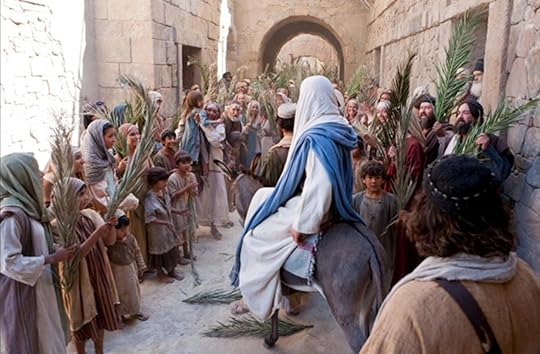
Today in the life of Jesus is the day the lamb for the Passover meal is to be selected—the 10th of Nissan. It is also the same day Jesus makes His triumphal entry into Jerusalem—the day we commemorate as Palm Sunday.
On the same day the people were selecting the lamb they would prepare for the Passover meal to take place in less than four days, Jesus, The Lamb of God is hailed by the people.
Imagine the dirt roads leading to the city bustling with great numbers of people who’ve come to celebrate the Passover. The widespread talk among the crowd is about Jesus raising Lazarus from the dead. As they see Jesus approaching the city on the way down the Mount of Olives riding on a donkey colt, (which fulfills Zech. 9:9 and Ps. 118:25-26), the whole multitude of His disciples make way for His passage, placing their cloaks and leafy branches they’d cut from the field on the road for Him to pass over. People were also waving palm branches symbolizing the notion of victory. These gestures indicate submission to Jesus as king—the Davidic Messiah. They acclaimed Jesus as the Messiah, but believed their delivery would be bring national victory from the authority of the Roman government.
They began to rejoice and praise God with a loud voice for all the miraculous works they had seen. Those who went before and followed after Jesus were shouting, “Blessed is the King who comes in the name of the Lord! Peace in heaven and glory in the highest! Hosanna! Blessed is He who comes in the name of the Lord! Blessed in the coming kingdom of our father David! Hosanna in the highest!”
As Jesus drew near to the city, He wept over it saying, “Would that you, even you, had known on this day the things that make for peace! But now they are hidden from your eyes.” Amid all the celebration, Jesus knew the people were blind to the reality of His mission. Although the rejection of Jesus was prophesied in the Old Testament (Isaiah 53:1 and 6:10), Jesus still feels great sorrow over their rejection, expressing the heart of the Father over Israel rejecting His prophets, and now His Son.
When Jesus entered, the whole city of an estimated 20-30,000 people was stirred up asking Jesus’ disciples “Who is this?” And the crowd said “This is the prophet Jesus, from Nazareth of Galilee.” Although Moses had predicted the coming of a “prophet like me to whom you shall listen” (Deut. 18:15-18) there is no indication the crowds here in Jerusalem, recognized Jesus as that prophet.
The jubilant elation among the people could be considered boarder-line riotous by the Roman government, subjecting the people to forceful control. Some of the Pharisees in the crowd spoke to Jesus saying, “Teacher rebuke your disciples!” Jesus replied, “I tell you, if these were silent, the very stones would cry out.” No doubt this further infuriated the religious leaders who feared Jesus would usurp their power.
Understand, Jesus knows the celebration of Him is all for the wrong reasons. They worshiped Him for the miracles He had done. They believed He was a man, inspired by God who could potentially release the Jews from the political oppression of the Roman government. Jesus also knows, within just a few days these shouts of exuberant accolation would turn into angry calls for His crucifixion.
In these days leading to the celebration of Passover, the religious leaders vehemently opposed Jesus. They concluded the only way to return order to the Jews was to kill Jesus. The next post will explore the plot to crucify Jesus.
For April 7-8, 2019 read and meditate on the following Scriptures:
Matthew 21:1- 10; Mark 11;1-11; Luke 19:28-44 and; John 12:9-50. 
Note: All the books in the award-winning Faith to Live By series are written to help people discover and live in life-giving truth. Visit the Author Page to learn more about the different books. When you purchase any of my products, you are helping support the ministry and spread the gospel of Jesus.
April 5, 2019
April 5-6 2019 – Jesus the True Shepherd
The Advent of Easter, Part XVI by Pamela Christian—Copyright © 2019
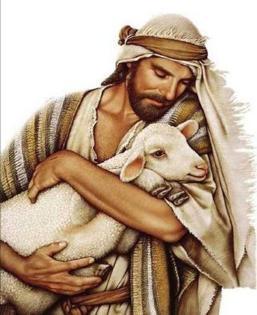 This time in the Advent of the first Easter was the early days of the Hebrew month Nissan—the first month on the sacred calendar. This was an exciting time with the atmosphere in the city amping up. Hebrew sojourners were arriving from various parts of the known world to return to Jerusalem, in the annual pilgrimage for Pesach, or Passover. Passover is one of the highest holidays, commemorating the time of the great Exodus—delivery of God’s people from the bondage of slavery.
This time in the Advent of the first Easter was the early days of the Hebrew month Nissan—the first month on the sacred calendar. This was an exciting time with the atmosphere in the city amping up. Hebrew sojourners were arriving from various parts of the known world to return to Jerusalem, in the annual pilgrimage for Pesach, or Passover. Passover is one of the highest holidays, commemorating the time of the great Exodus—delivery of God’s people from the bondage of slavery.
Large numbers of men, many with their families, have been streaming into the city in recent days. They are walking along dirt paths, with staff in hand, herding lambs which will become the sacred sacrifice for the Passover meal. Boys are skipping and running playing hoop-stick as they journey. Men are engaged in conversation about God delivering their forefathers through the Red Sea, miraculously opened up for their passage. They marvel at the recollection of this central event in Israel’s history.
Jesus, more than any other is keenly aware of God’s timetable. Knowing His days are short, Jesus uses every possible teachable moment to prepare His followers. We read in John 10:1-6:
“Truly, truly, I say to you, he who does not enter the sheepfold by the door but climbs in by another way, that man is a thief and a robber.2 But he who enters by the door is the shepherd of the sheep. 3 To him the gatekeeper opens. The sheep hear his voice, and he calls his own sheep by name and leads them out. 4 When he has brought out all his own, he goes before them, and the sheep follow him, for they know his voice. 5 A stranger they will not follow, but they will flee from him, for they do not know the voice of strangers.” 6 This figure of speech Jesus used with them, but they did not understand what he was saying to them.”
The sheepfold commonly was a courtyard near or beside a house and bordered by a stone wall, in which one or several families kept their sheep. This space or may not have an actual door, however the entry would have been guarded by a gatekeeper whose job was to make certain the sheep were not endangered by any intruders.
Israel’s exodus from Egypt is at times portrayed in terms a flock (the people) being led by its shepherd, (Moses).
Jesus knows the people’s physical exodus and release from slavery by God’s chosen deliverer for that earthly event, Moses, was a foreshadow of the ultimate spiritual exodus and delivery He would provide. Jesus, the long-awaited promised Deliverer, was among the people but they did not understand what He was saying to them.
On the 8th of Nissan, Jesus traveled to Bethany, the village where Lazarus and his sisters, Mary and Martha, lived. (Lazarus was one whom Jesus raised from the dead.) Jesus was their dinner guest. Out of profound gratitude for what Jesus did for her brother, Mary took a pound of expensive ointment made from pure nard, anointed the feet of Jesus, wiping them with her hair. Mary expressed her clear devotion to Jesus. On the 12th of Nissan, two days before Passover, at the house of Simon the leper, Jesus was yet again anointed with oil, only this time poured over His head. Both women were moved to express their devotion, without fully understanding the significance of their actions.
In that culture, it was hospitable if you had a guest in your house, to provide water in a bowl for them to wash their feet as they will have just walked through the dusty byways of Israel. To that water, you would add droplets of perfume to provide a pleasant aroma, but not to be wasteful in the amount that you add because in the Torah you were commanded not to be wasteful. The rabbis had decided when celebrating someone coming to your house it is appropriate to use perfume, but it is not acceptable to use pure nard. Why? Because this was seen to be a waste, so if you were wasting resources then you were violating a command of the Torah. Jesus defends the women explaining they are not rubbing the pure nard on His feet and pouring it on His head to celebrate Him; rather it is an act of mourning for His burial, and since it’s an act of mourning it fits in with the law.1
Jesus is more than the True Shepherd. He is also the Lamb of God, which we’ll explore with the next post.
For April 5-6, 2019 read and meditate on the following Scriptures:
John chapters, 10, 11 and 12:1-11; Mark 14:1-10.
1 “Understanding the Significance of Jesus Being Anointed By Oil,” https://inspired2think.wordpress.com/2015/04/11/understanding-the-significance-of-jesus-being-anointed-by-oil/
Scroll down below to access earlier posts in this series. To view the entire list of planned devotions, see the Introduction.
For author bio and schedule of posts for The Advent of Easter click here.
April 3, 2019
Word for Wednesday — Overcome Anxiety, Worry and Dread, Part I

Do you suffer with anxiety, worry, or dread? Do you find yourself fretting over various matters? You’re not alone. “Anxiety disorders are the most common mental illness in the U.S., affecting 40 million adults in the United States age 18 and older, or 18.1% of the population every year. Anxiety disorders are highly treatable, yet only 36.9% of those suffering receive treatment.” This is according to the Anxiety and Depression Association of America.
As I read the above quote, I couldn’t help but wonder, perhaps part of the reason anxiety goes largely untreated is because of it being referred to as a mental illness. I’m not a doctor of any sort, but I have an opinion about all this. In sort, we are all born mentally and physically ill. To be clear, every human being born since the first man Adam, and the first woman, Eve, has been born diseased. We don’t only suffer mental illness, we suffer body, soul and spirit illness. We are utterly diseased in every element of our being.
As human beings we are made body, soul and spirit. Our bodies are the physical being that houses our non-physical soul and spirit. Our soul is the part of us that consists of our mind, will, intellect, emotions, and unique personality. Our spirit is the part of us that allows us to commune spirit to Spirit. Both our spirit and soul are eternal; whereas our bodies are temporal. Ever since the first man, Adam, and the first woman, Eve, rejected God, the Creator of all that exists, sin entered Creation. Rejecting God is sin, and every human being born since Adam and Eve have inherited this naturally-born sin condition. Sin separates us from God and all that is good.
The world, as God intended, was to be one where humanity, made in His image, enjoyed unhindered communion with Him and one another, free of all illnesses. Sin ushered in the ravages of sickness, disease and death. The entity that influenced humanity to reject God is a fallen heavenly angle known as Satan. Satan, like all God’s created beings was given freewill—that is the choice to receive or reject God. Satan chose to reject God and also influenced nearly one-third of the angels in heaven to do likewise. God banished them from heaven and at that point immediately set a plan in motion to deal with sin—which, again, is the rejection of God.
Every single human being is naturally born with sin. Sin separates us from God and all that is good. Sin means we are deceived about truth—the truth about God, about ourselves and Satan. Satan is known as the Father of Lies and he influenced Adam and Eve to reject God. As a result all humanity is born under his evil and destructive influence. However, God’s love wins out!
God’s love for each of us, created in His image, motivated God in His infinite wisdom and power, to provide a way of escape from sin and all it manifests, for any and all who desire to live in truth and be restored in right relationship with Him. Jesus, the Second Person of the Triune God-head, came to this earth as our Promised Redeemer to provide us a way of escape from the ravages of sin. Anyone who places their faith in Jesus as their personal Savior and Lord, are fully and entirely redeemed from all the effects of sin: body, soul and spirit. This is a spiritual reality that overpowers our physical reality, providing we partner with God learning how to apply redemption from our new-born spirit, through our mind and unto our body.
A person who places their faith in Jesus is miraculously spiritually born-again. Our old natural-born spirit is done away with, and replaced with an entirely new holy Spirit born of God. The spirit and soul of such a person is united with God and destined for heaven for all eternity. In the meantime, as this regenerated individual continues to live on earth, they are now subject to the realities of both heaven and earth. Those who place their faith in Jesus to be redeemed are known as Christians. Christians are said to be in this world but not of it. Christians are commissioned by Jesus to bring God will in heaven to be done on earth. This is accomplished through the renewing of our mind. Our mind is the control center for our body. When we learn how to have our minds completely surrendered to God, by the power of His Holy Spirit influencing our new spirit, we find victory over all matters in this physical world.
Understand, this ability to overcome is not once and done. It is a an on-going awareness and effort that must be continually applied. As we live in a fallen world, we will continuously be influenced by all that sin represents. We must therefore be diligent, alert, and aware so as not to be inadvertently deceived. This truth about our ability to overcome all that sin represents is simple, but far from easy.
I am NOT saying God’s plan for us to overcome, dismisses medical science. God gave humanity intelligence and He has revealed truths, allowing us to discover His universe. Medical science is one of the many tremendous blessings from God to help us successfully live in this fallen world. Even so, without subjecting medical science, or any matter, to the truth of God we can veer off His course.
Faith is the mechanism that redeems us. Fear is what defeats us. The root of all anxiety, worry, and dread is fear. And as the Bible clearly states, fear is of the enemy. With my next Word for Wednesday, I will explore how we can learn to engage in the practical steps of renewing our minds to gain victory over fear.
I welcome your comments as my desire is to post content to help you live the victorious, abundant life Christ died to give us.
April 3-4 2019 – Jesus Did Not Come to Judge
The Advent of Easter, Part XV by Pamela Christian—Copyright © 2019

Let’s consider the timeline to have a better understanding of the day by day realities for Jesus as He approached His final days on earth. The Sacred Calendar year for the Jews starts with the month of Nissan, also called Abib. This first month corresponds with our March and April. I find this especially meaningful this year since Lent began March 6 and Easter is April 21, 2019.
A day in the ancient Jewish culture begins at sunset and concludes at sunset. Working backward from Nissan 14, which we know is the required day for the Passover to begin, I estimate today’s post for this Advent of Easter blog represents Nissan 8, which is six days before Passover in the life of Jesus.
Knowing His last days on earth were upon Him, Scriptures reveal Jesus spent considerable time in the presence of His disciples teaching the people and admonishing the religious leaders, making use of His final hours, intensely instructing about the Kingdom. John 8:12, begins a beautiful account of Jesus’ mortal life in these final days, which it appears John has recorded chronologically, concluding with John chapter twenty-one.
At this point in His ministry, Jesus had drawn a great number of people unto Himself, whereas the religious leaders of the day rejected Him. While His first coming was not to be as final judgment upon Creation, He did bring with Him division and thus judgment from another sense. To judge, can mean to rightly evaluate, and clearly Jesus rightly evaluated events and people throughout His ministry.
The religious leaders openly accused Jesus’ claims about Himself as false. Responding to their accusations Jesus replied, “I am the light of the world. Whoever follows me will not walk in darkness, but will have the light of life.” So the Pharisees said to him, “You are bearing witness about yourself; your testimony is not true.” Jesus answered, “Even if I do bear witness about myself, my testimony is true, for I know where I came from and where I am going, but you do not know where I come from or where I am going. You judge according to the flesh; I judge no one. Yet even if I do judge, my judgment is true, for it is not I alone who judge, but I and the Father who sent me. In your Law it is written that the testimony of two people is true. I am the one who bears witness about myself, and the Father who sent me bears witness about me.” They said to him therefore, “Where is your Father?” Jesus answered, “You know neither me nor my Father. If you knew me, you would know my Father also.” These words he spoke in the treasury, as he taught in the temple; but no one arrested him, because his hour had not yet come. (John 8:12-20 ESV – italics added)
God the Father intentionally planned every event of Jesus’ life—the specific point in time and place where he’d be born, the specific events and impact of His life, and the specific manner and hour He would die. Jesus first came to be the substitute sacrifice for your sin and mine, so we could have a way of escape from the consequences of sin and be redeemed through faith in Jesus. Imagine these final days leading up to the wrongful trial and unjust crucifixion of Jesus and how Jesus, fully aware of the timing and plan of God, earnestly spent His time presenting the truth so those who would come to faith, would do so.
It is not the heart of God that anyone would perish, but for all to receive everlasting life (2 Peter 3:9-10). Hell is a place for all beings who reject God, who deny Christ and have no desire to be rightly related with God. Hell is not a place God sends beings to—it is a place beings, angelic and human, choose for themselves. There will be a future event where Christ returns and the whole of Creation will be judged. Until then we live in the time of opportunity—we live in a time where we can choose life; eternal life through faith in Jesus. Those who deny Jesus, will face their personal judgement the day their earthly life is taken from them.
There is nothing God does that has no purpose. Everything He does has tremendous significance—nothing is happenstance. This was true in Jesus’ life and it’s true in yours and mine. Consider the tremendous mercy of God, having Jesus come to earth to become the substitute sacrifice in our place. Jesus’ earthly ministry was one of redemption and reconciliation. God could have judged us for rejecting Him. However, because He is love, He was motivated by love to offer us a second chance to choose life. Jesus’ first appearance on earth was not as judge, (see John 3:17 and 12:47), but as the Promised Redeemer.
Deuteronomy 30:19-20 is an opportunity for every one so long as we are breathing on this earth: “I call heaven and earth to witness against you today, that I have set before you life and death, blessing and curse. Therefore choose life, that you and your offspring may live, loving the LORD your God, obeying his voice and holding fast to him, for he is your life and length of days, that you may dwell in the land that the LORD swore to your fathers, to Abraham, to Isaac, and to Jacob, to give them.” (ESV)
Recognizing Jesus as the True Shepherd is the focus of the next post.
For April 3-4, read John 12:44-50 and meditate on the central message of this post and what it personally means to you, as part of your preparation in the Advent of Easter.
Scroll down below to access earlier posts in this series. To view the entire list of planned devotions, see the Introduction.
Note: Hosting this blog site and the other ministry work I do have expenses that must be covered. If this work is blessing you, please show your support through prayer, sharing with others, and financially. Donate HERE . If I can be of further help to you through prayer or answering questions, please email me at info@PamelaChristianMinistries.com



